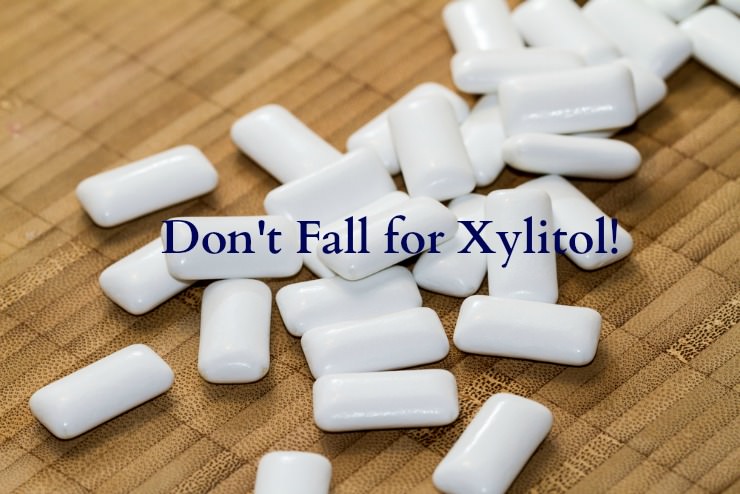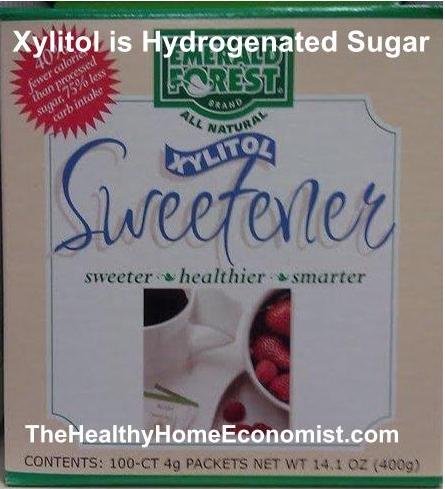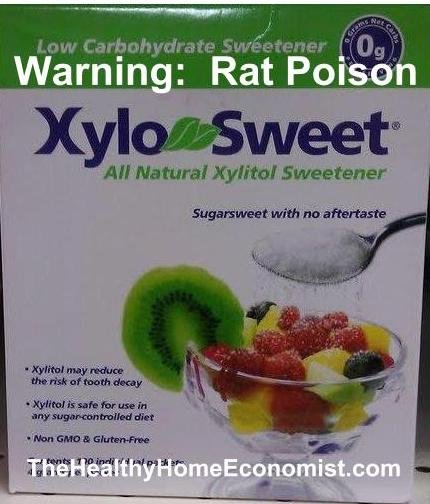
Xylitol is truly the darling of sugar substitutes today. The American Dietetic Association touts its use, with this sugar alcohol sold alone and as a sweetener in a variety of processed foods. Health benefits include a reduced glycemic response compared with sucrose, increased absorption of B vitamins and calcium, and even a reduction in dental caries risk.
Consequently, people with blood sugar issues are flocking to processed foods containing this alternative sweetener as a way to satisfy that sweet tooth without the downside of exacerbating the risk factors for Metabolic Syndrome. This condition is known for the markedly increased likelihood of developing heart disease, stroke, and type 2 diabetes.
Even the healthfood community almost universally considers this sugar alcohol to be a healthy substitute for sugar. A primary reason is that it doesn’t directly contribute toward the growth of intestinal yeasts aka Candida.
Have you noticed that the check out aisles at health food stores are typically loaded with chocolates and other sweets containing at least some xylitol? The truth is that I have yet to talk with any health-conscious person who suggests to me any downside other than the potential for intestinal cramps if you get too much.
Xylitol is Naturally Found in Nature
Xylitol is, after all, a naturally occurring substance. Manufacturers of xylitol market it as derived from xylan. The fibers of many plants contain it, including berries, oats, beets, sugar cane and birch. Sounds pretty harmless at first glance.
The FDA has even granted xylitol GRAS (Generally Recognized As Safe) status. You can’t get any safer than that, right?
 Manufacturing Process
Manufacturing Process
It is true that xylitol is a naturally occurring substance. However, manufactured xylitol is another matter entirely. Food manufacturers produce it using the industrialized process of sugar hydrogenation. In order to hydrogenate anything, a catalyst is needed. In this case, Raney nickel is used which is a powdered nickel-aluminum alloy. (1, 2)
This poses the risk of heavy metal residue and contamination. Nickel, by the way, is a recognized carcinogen and aluminum is associated with the development of dementia. Heavy metals in the body are notoriously difficult to eliminate with frequent use of infrared sauna probably a good idea.
This alternative sweetener doesn’t seem quite so warm and fuzzy anymore, does it?
There is currently no literature on any detrimental health effects of consuming hydrogenated sugar. However, food manufacturers widely used hydrogenated fats for decades before the very damaging effects of cardiovascular health became widely known!
Given the violent industrialized process that is required to produce a hydrogenated sugar like xylitol, it would seem wise to avoid it based on the very poor track record of hydrogenated foods in general.
Most Xylitol Sourced from GMO Corn
While it is true that xylitol can be derived from the xylan of birch trees, xylan is also found in corn cobs. It is much cheaper to use corn instead of birch bark to derive xylitol and so what do you think manufacturers prefer? Corn, of course.
Therefore, unless the label of a xylitol-containing product specifically notes that it is from birch or another nonGMO source, xylitol is very likely from genetically modified corn or possibly GMO sugar beets.
This is the same problem as high fructose corn syrup (HFCS) and white sugar from beets. Food manufacturers rely heavily on these sweeteners in the production of sodas and sports drinks.
You get a dose of GMOs with every sip! More on GMO dangers including sterility and stomach holes at the provided link.
Usage Contributes to Gut Imbalance
The digestive process does not break down sugar alcohols like food. Rather, xylitol arrives intact into the intestines.
At that point, a process called “passive diffusion” takes place. This means that the xylitol draws water into the bowels. Only a partial breakdown is the end result. The unmetabolized portion ferments providing the perfect environment for undesirable bacteria to thrive and grow.
It is true that xylitol itself does not feed candida directly as sugar does. As a result, this artificial sweetener is even promoted as a useful part of the Candida Diet. Unfortunately, the fermentation of undigested xylitol in the gut most definitely can exacerbate yeast problems. Don’t be fooled by this argument!
This is exactly why consuming xylitol can make some folks so gassy and even trigger cramping and diarrhea. Gut pathogens having a heyday in your intestines give off a lot of smelly toxins!
Other Little Known Problems
Xylitol can contribute to acid reflux problems. As a result, those who have issues in this area should avoid it for that reason alone. Chronic acid reflux is a serious problem that can lead to cancer of the esophagus and larynx.
In addition, those who suffer from seizures of any kind should stay away from this alternative sweetener as it can increase the frequency of epileptic attacks.
Two Pieces of Xylitol Gum Can Kill a Rat?
According to unpublished lab tests, approximately 1.65 grams of xylitol kills a 100-gram rat half the time.
Two little pieces of xylitol gum contain about .7 – 1 gram. This is probably enough to meet the definition of rat poison.

Cavity Prevention
Many people are chewing xylitol gum due to compelling scientific evidence for cavity prevention. What about children, however?
Rami Nagel, author of Cure Tooth Decay, doesn’t even recommend xylitol gum for this purpose. His research for any long term safety data turned up the following:
- Epidemiology: No information found
- Teratogenicity: No information found
- Reproductive Effects: No information found
- Mutagenicity: No information found
- Neurotoxicity: No information found
In summary, using this modern substance officially renders you a guinea pig, my friend! It seems that any benefits of cavity prevention are outweighed by the fact that there is no actual safety data backing up its use.
Safe Uses of Xylitol
Given all the problems that consumption of xylitol can trigger, it seems best to bypass the use of this sugar substitute on a regular basis.
Can it ever be helpful? Does it have any benefits whatsoever?
Potentially so. The only time I personally would ever consider using xylitol is to help resolve a childhood ear or sinus infection in order to prevent the use of drug-based antibiotics.
There is evidence that this popular sugar alcohol can indeed help encourage a healthy balance of beneficial bacteria found in the ear canal and sinus cavities. Products like this incorporate xylitol for this purpose.
A therapeutic dose can help resolve infection in these areas quickly with no medication required.
Thus, if you choose to use it, make sure it is sparingly and therapeutically (not as food). Also, make sure it does not come from a GMO source like corn!
References
(1) Xylitol production via catalytic hydrogenation of sugarcane
(2) Catalytic hydrogenation of xylose to xylitol using ruthenium catalyst on NiO modified TiO2 support
(3) Cure Tooth Decay by Rami Nagel
(4) Sugar-Free Blues: Everything You Wanted to Know about Artificial Sweeteners
More Information
Yacon: Healthy Syrup or Healthfood Hype?
Jaggery: India’s Sweet Gift








I am always skeptical of any “natural” sugar alternatives.
Wasn’t that surprised. I’m just trying to stay away from sweet stuff all together right now. No matter if its honey or stevia I still seem to have more sugar cravings after eating them. Xylitol always tasted too chemical tasting to me.
Was not keen on this long before the article. I did not feel “well” when I ingested anything that contained it.
Loved this post. I get TONS of questions about sugar alcohols, but my passion for researching the info isn’t there. I am just not interested in digging it all up because I am not personally looking for any reason to think it’s “okay.” So, thanks for this 🙂
was she angry with you or angry at the facts?
I prefer to avoid it, just like all the other “natural” artificial sweeteners. It was a good post and I think people need to be aware of the unhealthy products being labeled as “healthy”.
TMH –
Thank you for your voice of reason. While I appreciate much of what Sarah has to offer on her site (the videos are great), many of her articles, including this one, are ripe with sensationalism without much evidence to back it up. It may be that she is right on the money…but there isn’t much evidence to support that. Nor is there much evidence to support she is wrong. A few months ago, Sarah had a post about a nifty way to remove embedded ticks, involving using soap. So many people responded to her, including those with direct Lyme’s disease experience, begging her to retract the article, which she eventually did. I appreciate Sarah’s presence on the net though I take what she says with a grain of…xylitol 🙂
I don’t get this article. Is this just a try to throw as much dirt at Xylitol as possible in the hope that something will stick? There are hardly any facts in here, that would support the notion that Xylitol is not as warm and fuzzy as the big bad media would like you to believe.
Of course, Xylitol is an industrial product, so yes, it is “manufactured,” and yes, it is hydrogenated. But how exactly is that bad? Just because some hydrogenated foods are not great, does that mean everything that is hydrogenated is bad? Under that logic, water would be bad, because it is hydrogenated oxygen. And to translate the use of a catalyst into the presence of heavy metals in Xylitol requires quite a bit of creativity. Where are the measurements of heavy metal residue in Xylitol to back up such fear mongering? If you don’t like GMO’s, just don’t buy GMO products. It’s just that easy. And no, just because Xylitol is made from corn does not mean it is as bad as HGCS, sorry. Many things are made from corn, some are good, some are bad. Same origin does not mean same quality.
Similarly, the argument that because only part of the Xylitol is broken down, the unmetabolized portion ferments, which would lead to the growth of undesired bacteria, is hard to follow. I’m not sure I understand this: all bacteria in your gut “ferment” unmetabolized foodstuff. That is why they are there. They grow much slower on Xylitol than on sugar, because they cannot break it down as easily, just like they cannot break down other carbohydrates as easily, e.g., fiber. So Xylitol actually does not “ferment” as much as other things we eat, e.g., non-hydrogenated sugars. Most of it comes out the other end unchanged. That’s the whole point of eating it – tasting the sweet without ingesting the calories. Why would that invite any undesired bacteria?
The prize for most creative argument, however, goes to “don’t eat anything that could kill a rat.” If you would go by this in your daily diet, you would have to strike a bunch of stuff off you food list. Why does it matter that rats or dogs cannot handle this stuff? Humans can. So by all means, eat it. Just don’t give it to your rat.
Of course, there is anecdotal evidence of people getting headaches and so on, but does that mean this stuff is bad for humans in general? Does the fact that a bunch of people die each year from eating peanut butter mean that we should ban this food from our pantries?
None of the arguments in the article are funded in fact. They are all just pretty ill-conceived comparisons and extrapolations without validity and without any true relevance to human diet. From the responses in the discussion here, it seems that that is enough to strike fear into many of the readers of this blog.
THANK YOU FOR THIS. Ugh, this article was getting on my nerves for just these reasons.
AMEN TO THIS! Xylitol has SO many wonderful benefits to the topical application to oral health that I feel this article (since your fan base is wide spread for this blog) is misleading and causes fear instead of causing people to do their own further research.
Thanks for this article! I’ve been using xylitol here and there for a few years and hadn’t heard much, if any negative findings on it. I always try to stay informed about what I put in my body, so it’s great to hear exactly how this is being processed. I had a feeling there was something fishy going on with xylitol. It always seemed too processed and artificial looking to really be healthy. Thanks for the info!
Several LLMD’s (Lyme Literate Medical Doctors) are using it sparingly and only a small dose 3x a week to help bust open the Lyme Biofilms. So whatever little toxins it may have is being put to good use. And of course it’s spread out so you don’t take it for 2 weeks.
I have been chewing gum with Xylitol for the last few days and have just started noticing the end of my tongue feeling very irritated and strange. Wonder if it’s from the Xylitol. Will stop using the gum and see if the irritation clears. Could not find anything on the label to indicate the source of the Xylitol, corn or birch. One of last ingredients is soy lecithin. Is that bad?